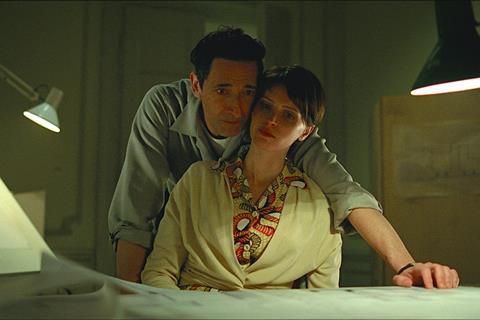Brady Corbet’s meticulous Silver Lion-winning drama centres around a Hungarian architect in 1940s America

Dir. Brady Corbet. UK/US. 2024. 215mins
Wits may joke that the most brutal thing about Brady Corbet’s The Brutalist is its formidable running time. That uncompromising factor apart, there is nothing specifically brutal in execution or content about Corbet’s drama, the title referring to the architectural style practised by the film’s hero, a Hungarian-born Jewish architect who emigrates to the US in 1947. The Monumentalist might have been a better title, certainly as regards the ambition of the film’s ferociously individual writer-director – a dissident among American cineastes, whose allegiances are primarily to the European tradition at its most rigorous.
A sprawl of a dramatic maze
In his third feature, following The Childhood Of A Leader and the bracingly provocative pop drama Vox Lux, Corbet has adopted a more American tone, mixing the amplitude of Kubrick or Paul Thomas Anderson with the myth-making tenor of The Fountainhead. Shot with an impudently anachronistic flourish in VistaVision,The Brutalist is defiantly its own kind of construction, but longueurs and narrative inertia make it not quite the resounding statement it aspires to be. Despite a formidable cast headed by Adrien Brody and a mightily impressive Guy Pearce, this is likely to attract few pilgrims, even among the arthouse hardcore, although the win of a Silver Lion at Venice and a pick-up by A24 for US release will see it find its faithful.
With its script by Corbet and Mona Fastvold (The World To Come) steeped in architectural knowledge and modern European history, the film traces the progress of Jewish Hungarian immigrant Laszlo Toth (Brody), a Bauhaus architect who arrives in the US after the Second World War and tries to restart his career while awaiting the arrival of his wife Erszebet (Felicity Jones). The film begins with an intense flurry of barely readable single-take action (one suspects a tip of the hat to the radical visual style of Son Of Saul director Laszlo Nemes), ending on a vision of an upside-down Statue of Liberty – establishing the theme of an America that confounds those that it ostensibly welcomes.
Another key theme is that smiling Establishment benefactors can’t be trusted. Toth and his thoroughly Americanised cousin (Alessandro Nivola) get a commission from a spoiled heir (Joe Alwyn) to build a library for his father, Harrison van Buren (Guy Pearce), but that project ends in disaster. Later, though, van Buren rescues Toth from hard times by commissioning a spectacular building in honour of his adored mother – at which point it becomes apparent that Toth’s visionary ambition may set him on the path to madness.
Shot with an impudently anachronistic flourish in that hallowed format VistaVision, The Brutalist is indeed its own kind of monument – a sprawl of a dramatic maze, with a 15-minute intermission inserted at its centre – and with a visual magnificence that, while sumptuous, adheres to an essential austerity that Toth would approve of. Lol Crawley’s cinematography and Judy Becker’s imposing designs make this something to be marvelled at visually, not least in a genuinely hallucinatory sequence in the marble quarries of Carrara.
The dramatic flaws are, however, inescapable. Part of the problem is that Toth’s Promethean struggles are not that involving in themselves – although it’s hard to resist interpreting the film as an allegory of the difficulty of auteur film-making in the face of financiers’ interference. And the relationship between Toth and Erszebet, once she arrives, never compellingly takes centre stage, partly because of an underdeveloped role for Jones (who, utterly youthful and fresh-faced, never convinces us that her character has been through the hell of the European camps). Brody – his gaunt perma-angst suggests a revved-up version of his character in The Pianist – never quite makes Toth either likeable or, more importantly, distinctive a character. A smooth-faced Pearce, however, comprehensively dominates every scene he’s in, as a charismatic patriarch with a predictably dark underside.
Daniel Blumberg’s propulsively ominous score is very much in keeping with the signature that Corbet has established to date – as do the credits, in Constructivist style. The film is to be admired, certainly, but what makes it hard to love is its lack of a certain human approachability and, more damagingly, of any hint of humour.
Production companies: Brookstreet Pictures, Kaplan Morrison, Andrew Lauren Productions
International sales: Focus Features info@focusfeatures.com / US Sales: CAA filmsales@caa.com
Producers: Trevor Matthews, Nick Gordon, Andrew Morrison, Andrew Lauren, D. J. Gugenheim
Screenplay: Brady Corbet, Mona Fastvold
Cinematography: Lol Crawley
Editor: David Jancso
Production design: Judy Becker
Music: Daniel Blumberg
Main cast: Adrien Brody, Felicity Jones, Guy Pearce, Joe Alwyn















![[L-R]: Amanda Villavieja, Laia Casanovas, Yasmina Praderas](https://d1nslcd7m2225b.cloudfront.net/Pictures/274x183/6/4/1/1471641_pxl_20251224_103354743_618426_crop.jpg)








